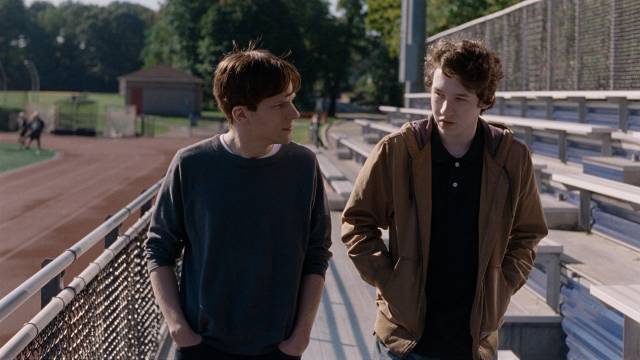
 What should a war photographer do: take a picture of people suffering to best represent their personal pain, or turn the picture into something larger and in doing so, reduce the figures at hand and potentially misrepresent them? These are the thoughts of Isabelle Reed (Isabelle Huppert), who is already deceased when the action of Louder Than Bombs begins, but it applies to the subjects of this film as well.
What should a war photographer do: take a picture of people suffering to best represent their personal pain, or turn the picture into something larger and in doing so, reduce the figures at hand and potentially misrepresent them? These are the thoughts of Isabelle Reed (Isabelle Huppert), who is already deceased when the action of Louder Than Bombs begins, but it applies to the subjects of this film as well.
The film begins as Reed’s husband and sons are forced to re-engage with the death of their wife and mother in the face of a retrospective of her work to be held shortly in New York. Three years after her death, none of them has strictly fallen apart. Her husband (Gabriel Byrne) has started seeing other people. Her older son, Jonah, (Jesse Eisenberg) has just become a father, and her younger son, Conrad, (Devin Druid) has hit puberty and fallen in love. But mourning in this film is not linear or progressive. Like the structure of the film itself, the grief over the loss of a loved one is both circular and cathartic. It is not a trap, but it will also never go away. What clarity is gained is tempered with an equal knowledge of the eternal struggle.
The film unfolds episodically, but with a satisfying weight and pacing to each part. The central story is studded with scenes from before, but not as “flashbacks” so much as the honest inclusion of the way the past constantly re-emerges with and weaves into the present. The viewer gradually understands more and more of the family, its dynamics and its dysfunction. Some revelations can almost seem like plot twists, but they feel too honest and coherent to earn that term.
Yet if all of this comments on something larger -- that is grief in general, family dynamics, and memory -- how can we understand the story and each character in all of their specificity? The macro is much easier than the micro, for the viewer to digest. This would also seem to be the path chosen by Isabelle, whose devotion to her job as war photographer was often to the detriment of her relationship to her family. But director, Joachim Trier, is not averse to the micro. The richness of the film lies in the way he manages to capture what feel like real people, especially in the case of the younger son, whose portrayal by Druid is achingly good. What is achieved most powerfully in this movie is contradictions. Two opposite feelings can exist simultaneously in a person. Paradoxes are not an impasse in the realm of human feeling. And it is as a result of them existing together, that all of the richness of life (and movies) is possible.